Why is My Samsung Refrigerator Making Noises? (Step-by-Step Fixes for 7 Issues!)
Many Samsung refrigerator owners have encountered an unsettling problem – their appliance is making strange noises. The humming, buzzing, or rattling sounds can cause concern, but rest assured, a noisy fridge is not always a sign of a major issue. In this article, we will explore the potential causes of these noises, so you can better understand what’s going on inside your Samsung refrigerator.
The most common reasons for a Samsung refrigerator to make noises are the normal operation of the fridge or problems with the compressor, evaporator fan motor, condenser fan motor, start relay, cooling fans, or parts that have become loose over time. Some issues are easily resolved, while others will require professional help.
To help you diagnose and potentially fix the problem, we’ll discuss several common reasons for a noisy Samsung refrigerator along with step-by-step instructions for fixing it!
The Most Common Samsung Refrigerator Sounds
Let’s go through some typical noises your Samsung refrigerator may make and what causes them:
1. Grinding Noise: A grinding noise usually comes from the refrigerator’s fan. If you hear this noise while the ice maker is on, it’s normal – the sound comes from ice being dispensed into the bucket. If the grinding noise persists, the fan might have debris or ice build-up. To solve this, try defrosting your refrigerator and ensure there’s no blockage near the fan.
2. Buzzing Noise: Buzzing noises are a common sound, especially when the refrigerator compressor is running at the beginning of a cooling cycle or after filling a glass of water from the dispenser. This noise shouldn’t last longer than 7 seconds and is a normal part of functionality.
3. Rattling Noise: Sometimes, a rattling sound indicates that refrigerator components, such as the condenser coils, fan, or compressor, are loose. If they vibrate against other parts, it can create this sound. Ensure all the components are properly secured to avoid these noises effectively.
4. Knocking Noise: A knocking noise can be associated with the refrigerator’s compressor. You might notice this noise when the compressor starts or stops operating. Although it may be alarming, this is a normal sound that doesn’t usually require intervention.
5. Popping and Crackling Noises: These types of noises are typically heard in new Samsung refrigerators. They are caused by the expansion and contraction of plastic parts during temperature fluctuations, often in the defrost cycle. No action is required, as this is a normal occurrence in new units.
6. Humming Sounds: A refrigerator can emit a subtle humming sound as it operates. This usually comes from the motor and is perfectly normal. If the humming becomes excessively loud, it’s worth checking the refrigerator to ensure it’s level and stable.
7. Clicking Noise: You might hear a clicking sound as the defrost timer or temperature control switches on and off. This is an expected part of your Samsung refrigerator’s operation, but if it becomes excessive or too frequent, contact a professional for assistance.
Here is a quick table that summarizes the typical sounds and noises coming from a Samsung refrigerator:
| Noise Type | Possible Causes | Suggested Solutions |
|---|---|---|
| Grinding | Faulty evaporator fan motor | Clean or replace the evaporator fan motor |
| Buzzing | Compressor, water inlet valve, evaporator/condenser fan | Check compressor and fan motors, replace start relay if needed |
| Rattling | Loose drain pan, condenser fan, defrost timer | Secure drain pan, clean fan blades, consult technician for timer |
| Knocking | Damper, unbalanced refrigerator | Adjust fridge legs, check internal components like damper |
| Loud Noise | Imbalanced refrigerator | Check with bubble level, adjust legs |
| Clicking | Start relay, capacitor, dirty condenser or evaporator coils | Replace start relay, clean condenser or evaporator coils |
| Humming | Dirty condenser coils, faulty fan motor, clogged valve | Clean coils, inspect fan motor, clean water inlet valve |
| Dripping | Drain pan, drip tray | Check and clean the drain pan, level the refrigerator |
In summary, while some noises are normal in a Samsung refrigerator, others might be the result of loose components, ice build-up, or component malfunctions. If the sounds persist and you’re concerned, it’s always a good idea to consult a professional for further help.
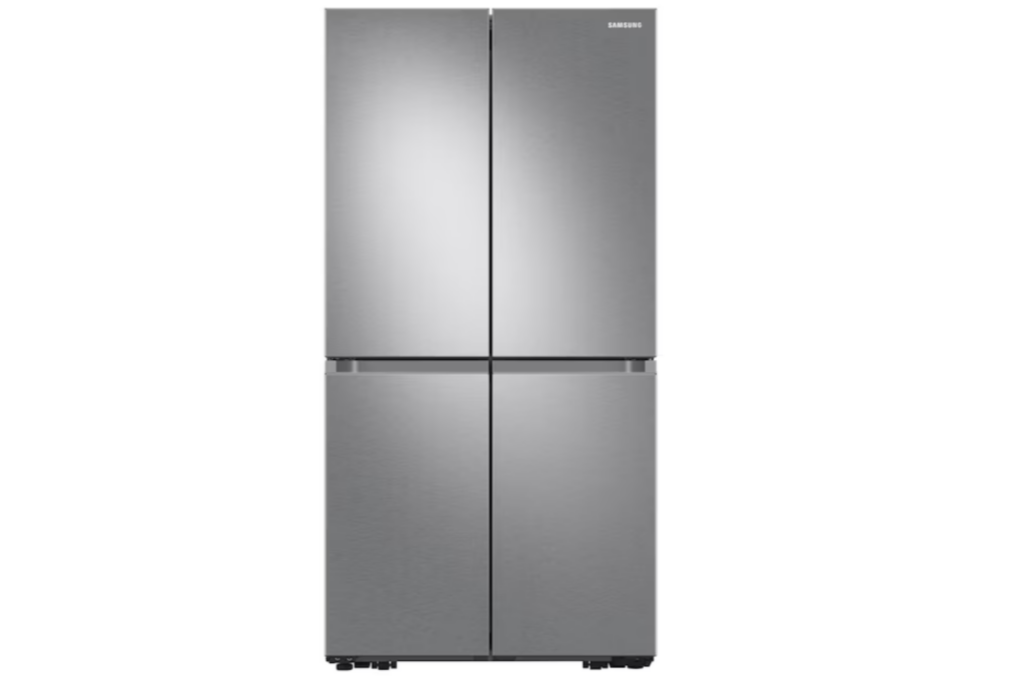
Why is my Samsung refrigerator making a buzzing sound?
There are a few reasons why your Samsung refrigerator might be making a buzzing sound. Some of these reasons include the ice maker, water line, and dirty condenser coils, among others.
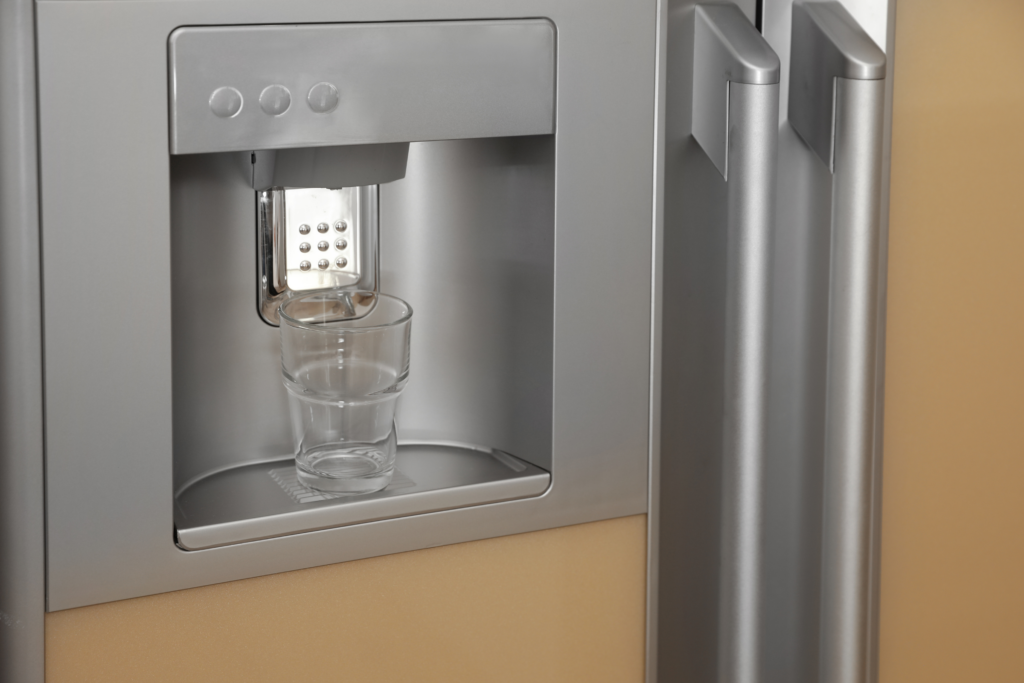
How to fix a Samsung refrigerator making a buzzing sound?
Here is a brief step-by-step guide for fixing the buzzing sound in your Samsung refrigerator:
- Check the ice maker: If you hear a buzzing or humming sound coming from your refrigerator, the first thing you should do is turn off the ice maker. The noise might be caused by the ice maker trying to start without water in it, especially if the water line is not connected.
- Inspect the water line: Ensure that the water line is connected and not kinked or damaged, as this could create a buzzing noise from the refrigerator.
- Clean the condenser coils: Condenser coils are located either on the back of the refrigerator or at the bottom, behind a panel. These coils help cool and condense the refrigerant, and they need to be cleaned regularly. Dust and vacuum debris on the coils to minimize the buzzing sound.
- Tighten loose components: Your Samsung refrigerator might create a buzzing sound if its internal components, such as the fan, compressor, or condenser coils, are loose. To fix this issue, inspect the mentioned components and secure them if necessary.
- Examine the refrigerator’s position: Ensure that your Samsung refrigerator is positioned properly and leveled on the floor. A slight tilt or uneven positioning may cause the appliance to generate unwanted noises.
If the buzzing noise persists after trying these solutions, it might be necessary to contact a professional for further assistance.
Why is my Samsung refrigerator making a humming sound?
Your Samsung refrigerator might be making a humming sound due to a few common reasons. One of these reasons could be the normal operation of the compressor. The compressor, which is the heart of the refrigerator’s cooling system, can sometimes produce a humming noise when running. However, if this noise becomes excessively loud or irregular, it could indicate a problem with the compressor.
Another reason for the humming sound could be loose components, such as the fan, compressor, or condenser coils. If any of these components are loose, they can vibrate against other parts, creating a rattling sound or humming noise.
A Samsung refrigerator can also make a loud noise when the icemaker fills up under high pressure or fails to do so due to a lack of water. Additionally, the fridge might also be unlevelled, or its vents might be obstructed, causing the humming sound.
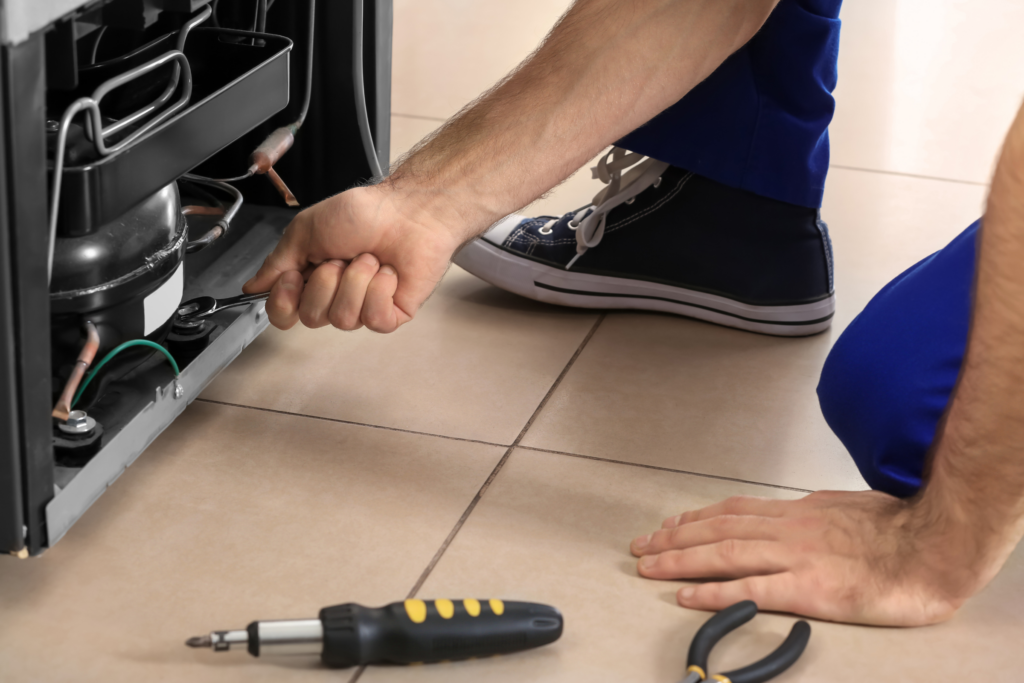
How to fix a Samsung refrigerator making a humming sound?
To fix your Samsung refrigerator’s humming sound, follow these simple steps:
- Check the Compressor: Listen to the compressor while it’s running. If the noise becomes too loud or irregular, consult a technician to inspect the compressor.
- Inspect for Loose Components: Examine the fan, compressor, and condenser coils for any loose components. Tighten any loose parts, or replace them if necessary.
- Clean the Condenser Coils: Dirty condenser coils can cause a buzzing noise. Unplug the refrigerator, and vacuum or gently clean the condenser coils using a soft brush.
- Examine the Icemaker: Ensure that the icemaker is functioning correctly and has enough water supply. If it’s malfunctioning or producing an excessive amount of noise, consider replacing the icemaker.
- Level the Refrigerator: Using a level, check if the fridge is sitting evenly on the floor. Adjust the legs or add shims if needed to level the refrigerator.
- Clear any Obstructions: Make sure that there are no blockages in the vents or near the refrigerator. Keep at least a few inches of space around the fridge to allow proper air circulation.
Why is my Samsung refrigerator making a clicking sound?
Your Samsung refrigerator might be making a clicking sound due to a few reasons, such as loose components, compressor start relay troubles, or dirty condenser coils.
It’s essential to identify the cause behind the clicking sound to take appropriate action.
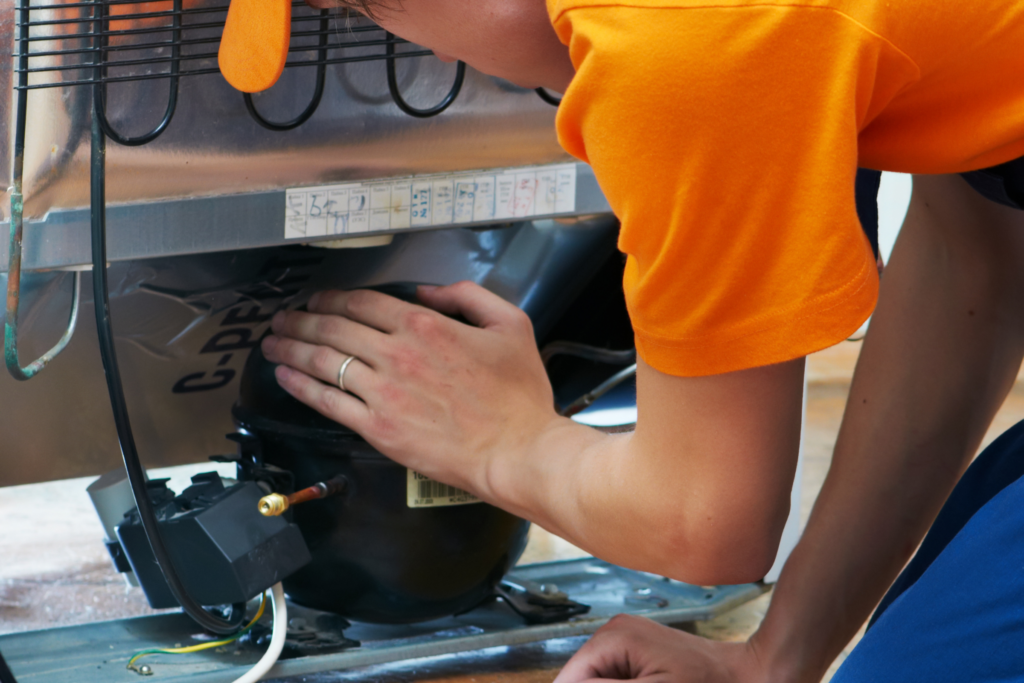
How to fix a Samsung refrigerator making a clicking sound?
Loose Components: One possible cause of a clicking sound in your Samsung refrigerator is loose components, such as the fan, compressor, or condenser coils. To fix this, start by identifying the loose components and then tighten them using a screwdriver to prevent them from vibrating against other parts.
Compressor Start Relay Troubles: If the clicking sound persists, it might be due to compressor start relay troubles. This component delivers voltage to the compressor and has an overload feature that cuts off when issues arise. To resolve this problem, inspect the relay for damage or any signs of malfunction. If needed, replace it with a new one.
Dirty Condenser Coils: Another common reason for a clicking sound from your Samsung refrigerator is dirty condenser coils. These coils are usually located on the back of your refrigerator, either close to the ground or resting anywhere in the back. To clean them, follow these steps:
- Unplug your refrigerator to ensure safety while working.
- Locate the condenser coils and remove any protective casing or panels covering them.
- Use a soft brush, such as a refrigerator coil brush, to gently remove dust and debris from the coils.
- If the coils are extremely dirty, you can also use a vacuum cleaner with a brush attachment to remove all the dirt.
- Replace the panels or casings covering the coils and plug your refrigerator back in.
By addressing these possible causes, you should be able to fix the clicking sound coming from your Samsung refrigerator and ensure its proper functioning.
Why is my Samsung refrigerator making a dripping sound?
A dripping sound in your Samsung refrigerator typically originates from the drain pan or drip tray that collects excess condensation or moisture created by the appliance.
This feature is present in many major household appliances to prevent puddling of water around the unit. The dripping noise can occur when the refrigerator is in its defrost cycle, as melting ice flows into the drain pan.
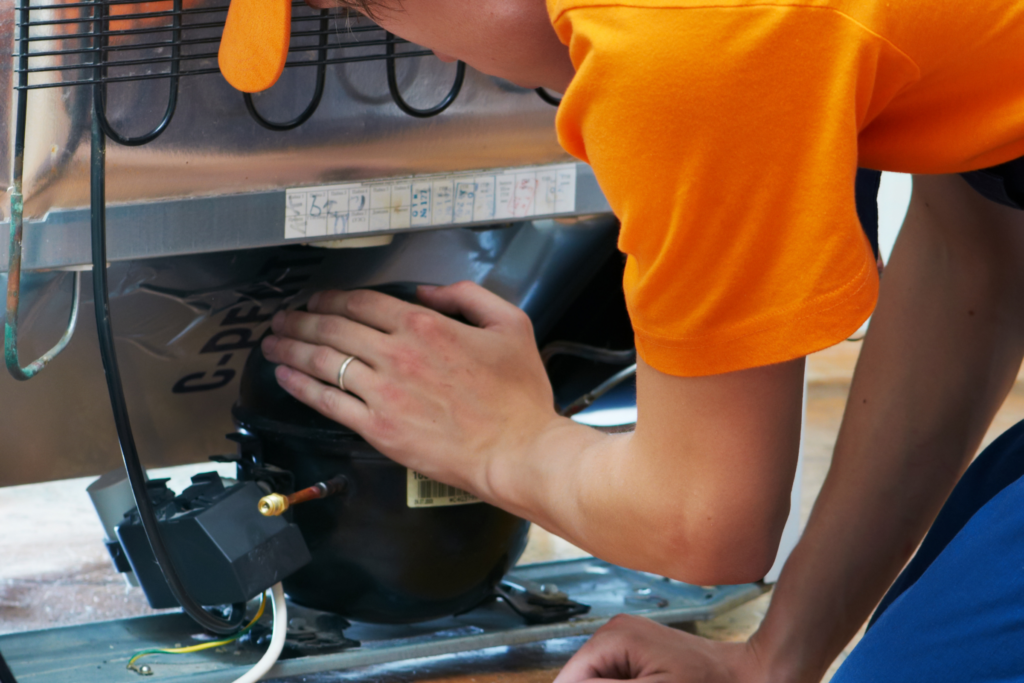
How to fix a Samsung refrigerator making a dripping sound?
- Check the drain pan: Firstly, locate the drain pan at the back or bottom of your refrigerator. Check for any damage or overflowing. If it appears full, carefully remove the pan and empty the excess water. Reinsert the pan and make sure it is properly aligned to catch any dripping.
- Inspect for ice buildup: Another possible cause of the dripping sound may be due to ice buildup in the freezer. This can block the drain line and result in water dripping inside the refrigerator instead of flowing to the pan. Defrost your refrigerator or remove the ice buildup, and make sure the drain line is clear.
- Examine the door seal: A damaged or loose door seal can allow warm air to enter your refrigerator, creating condensation that can produce a dripping sound. Make sure the door seals are properly sealed and in good condition. If they appear worn or damaged, consider replacing them to prevent further issues.
- Look for loose components: Occasionally, dripping sounds can occur if components inside the refrigerator, such as the fan or compressor, are loose and vibrating against other parts. This can create a rattling noise along with the dripping sound. Ensure all components are secured tightly and in their correct positions.
Why is my Samsung refrigerator making a grinding sound?
There could be several reasons for your Samsung refrigerator to make a grinding sound. Some possible causes include ice buildup around the fan area, obstructed fans, or loose components.
Let’s dive into the details and discuss how you can fix the issue.
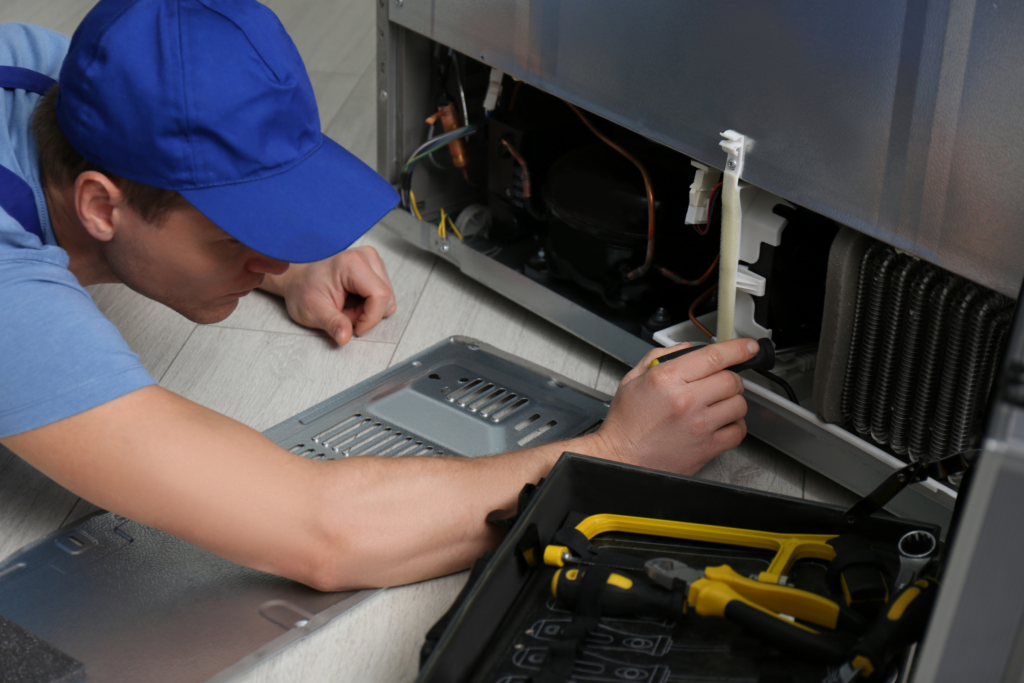
How to fix a Samsung refrigerator making a grinding sound?
- Check for ice buildup around the fan area: In many cases, inadequate defrosting can cause ice to develop around the fan area, creating a grinding noise. To fix this issue, turn off your refrigerator and let it defrost for a few hours. Ensure to remove all food items and store them safely during the process.
- Inspect fans for obstructions: Your Samsung refrigerator has two fans, the evaporator fan and the condenser fan, which might become obstructed, resulting in scraping or grinding sounds. Carefully inspect both fans, and if you find any obstructions, clean the fan blades and the area surrounding them.
- Examine loose components: Some components, such as the compressor, condenser coils, and fan motors, can become loose over time. If they are not secure, they may vibrate against other parts, producing a rattling sound or humming noise. Check these components and make sure they are tightly fastened.
- Clean dirty condenser coils: Dirty condenser coils can cause your refrigerator to work harder, creating amplified noises. Regularly cleaning the condenser coils can help to minimize the grinding sound.
Why is my Samsung refrigerator making a rattling sound?
Samsung refrigerators might make a rattling sound due to various reasons like the fridge being too close to the wall, improper leveling, or internal components like the compressor or condenser fan.
Let’s break down some of these causes and their corresponding solutions.
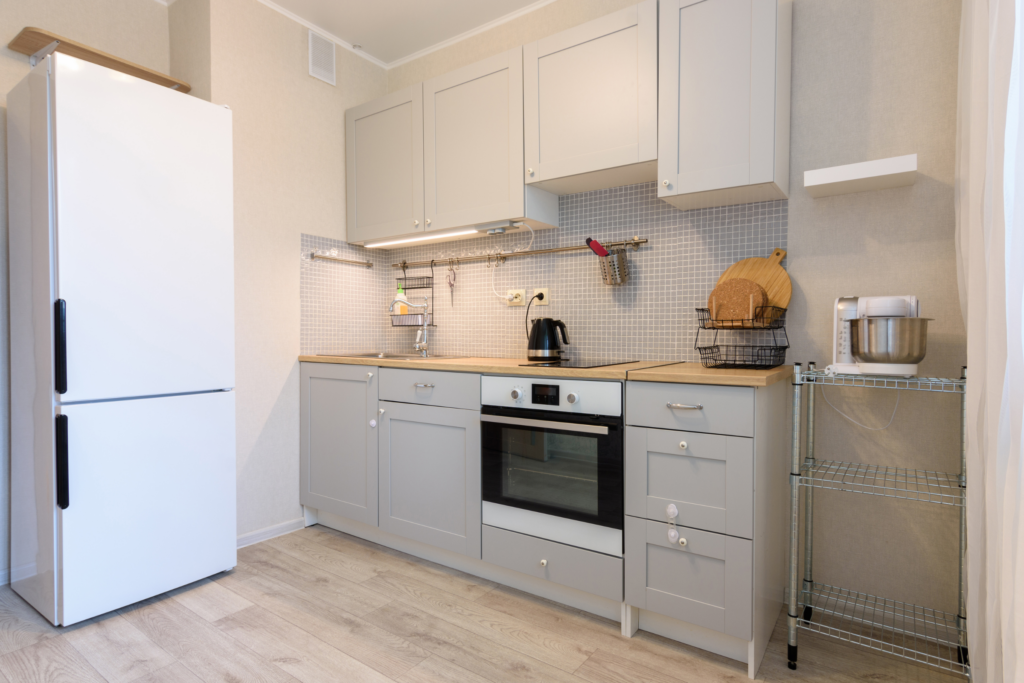
How to fix a Samsung refrigerator making a rattling sound?
- Repositioning the fridge: If your refrigerator is too close to the wall or any other objects, it might cause a rattling sound when it vibrates during operation. Try adjusting the position and maintain some gap between the appliance and its surroundings.
- Leveling the refrigerator: An uneven refrigerator might produce vibrating sounds. You can fix this issue by adjusting the leveling legs of your fridge. Ensure both the front and rear legs have firm contact with the floor for stability.
- Checking internal components: The rattling sound may also come from the internal parts like the compressor or condenser fan. Inspect these components for any signs of wear, loose fittings, or debris obstructing smooth operations.
- Compressor: The compressor in a Samsung refrigerator is responsible for circulating refrigerant to remove heat from the fridge’s interior. A noisy compressor might need professional assessment or replacement.
- Condenser fan: Make sure the condenser fan is functioning correctly and not obstructed by any debris. Clean any build-up of dust or dirt to ensure smooth operation and reduce noise.
Why is my Samsung refrigerator making a knocking sound?
Your Samsung refrigerator might make a knocking sound due to a variety of reasons, such as a frosted-over ice maker fan, loose water pipes, expanding and contracting plastic parts due to temperature changes, or a malfunctioning ice maker.
It’s important not to worry, as most of these noises are normal and don’t indicate a significant problem.
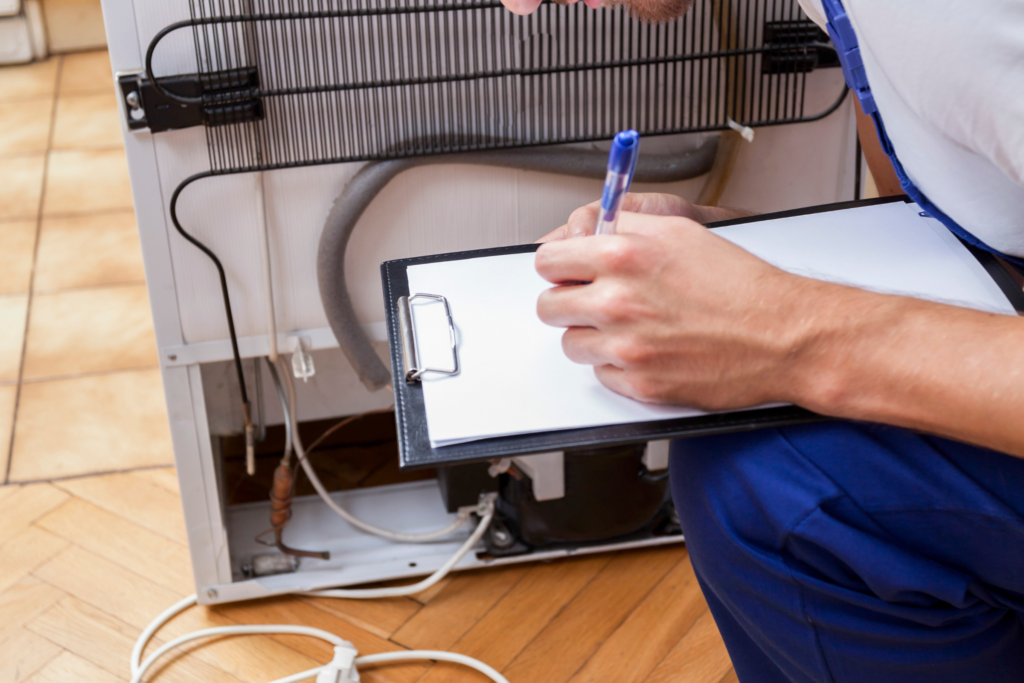
How to fix a Samsung refrigerator making a knocking sound?
- Check the ice maker fan: Frost or ice binding to the fan blades may cause a knocking or “chirping” sound. Defrost your refrigerator or remove any visible ice buildup to ensure smooth fan operation.
- Inspect water pipes: Loose water pipes might vibrate and knock against other components. Secure any loose pipes to prevent the knocking sound.
- Listen for plastic parts noises: Keep in mind that the plastic parts inside the refrigerator might be expanding and contracting due to temperature changes, creating cracking noises. This is more common in new refrigerators and usually isn’t a cause for concern.
- Examine the ice maker: If you have an ice maker, make sure it’s functioning properly. If it’s malfunctioning, it could be creating a knocking noise.
- Look for loose components: The refrigerator’s fan, compressor, or condenser coils may be loose and vibrating against other parts, causing a rattling sound or humming noise. Tighten any loose components to reduce noise.
Why is my brand-new Samsung refrigerator making funny noises or running loudly?
You might notice your new Samsung refrigerator making a variety of noises. Don’t worry, most of these sounds are normal, and you can usually fix them yourself.
Here are some common causes behind the weird noises you might be hearing:
It’s not uncommon for a brand-new Frigidaire refrigerator to make various noises during its normal operation. These sounds can be a result of different components working together within the appliance.
However, if the noises you hear are louder than usual or persistent, there might be a few underlying causes.
1. Evaporator or condenser fan – if the noise occurs when you open the door seal, it might be either of these fans. You can check the evaporator fan by examining the back panel of the freezer. If these fans are faulty or obstructed, they will create a noticeable noise.
2. Refrigerant tubing – As the refrigerator cools down or defrosts for the first time, the walls inside the fridge contract, creating cracking and popping noises. Gurgling sounds may also occur during the equalization of pressure inside the tubing.
3. Ice Maker – If it’s turned on but not connected to a water supply, you may hear recurring clicking, buzzing, or vibrating sounds. To resolve this issue, ensure that the icemaker is properly connected.
4. Ice maker noise: If your Samsung fridge has an ice maker, you may hear noises as it cycles through the process of creating ice cubes. The ice maker fills with water, freezes it into ice cubes, and then releases them into the storage bin. This is a routine operation and not a cause for concern.
5. Chiming or beeping sounds: Your fridge may beep or chime along with blinking simultaneously, which indicates a high temperature. This is normal during power outages or when the door isn’t shut properly, especially in Samsung models with alarm doors. Make sure the door is closed tightly to resolve this issue.
Diagnosing noises in different parts of a refrigerator
Noises from the Condenser Fan
The condenser fan is responsible for dissipating heat from the coils. If you hear noises from this area, it might be due to debris or dust buildup on the fan blades. To fix this issue:
- Unplug the refrigerator.
- Clean the fan blades using a soft brush or cloth.
- Plug the refrigerator back in and check if the noise has stopped.
If the noise persists, you may need to replace the condenser fan motor.
Noises from the Evaporator Fan
The evaporator fan aids in cooling the evaporator coils. Noises from the evaporator fan could indicate a faulty evaporator fan motor or debris obstructing the fan blades. To troubleshoot this issue:
- Unplug your refrigerator.
- Remove the rear panel in the freezer section, exposing the evaporator fan.
- Inspect the fan blades for debris and clean if necessary.
- If the issue persists, check the fan motor. You may need to replace it.
Noises from the Inlet Valve
The water inlet valve controls the flow of water to your refrigerator’s ice maker and water dispenser. If you’re hearing noises from the valve area:
- Disconnect your refrigerator from the waterline.
- Inspect the water inlet valve for any visible damage or debris.
- If debris is found, clean the valve. If damaged, replace it.
Make sure the water flow to your refrigerator is adequate, as restricted flow can cause noise. You may also consider replacing the water filter.
Noises from the Freezer Compartment
Noises from the freezer compartment can stem from various sources, such as the ice maker, air flow, or rear panel. To address these issues:
- Inspect the ice maker for any visible problems.
- Ensure proper air flow by checking the freezer section for any obstructions.
- Remove the rear panel to examine any internal components making noise.
Keep the freezer organized and avoid overstuffing, as this can restrict airflow and cause excessive noise.
Links Between Refrigerator Noises and Faulty Components
There are several possible reasons that your Samsung refrigerator is making noises. In many cases, these noises are linked to faulty or broken components. In this section, we will explore some common issues and their connections to refrigerator noises.
Buzzing Noise: A buzzing noise might indicate an issue with the compressor, which is responsible for circulating the refrigerant through the cooling system. A malfunctioning compressor can cause buzzing sounds as it struggles to maintain proper function.
Faulty Evaporator Fan Motor: If your refrigerator’s evaporator fan motor is faulty, it can create loud noises as it fails to circulate air properly. This can result in poor cooling, and the noise will likely be more noticeable when the refrigerator door is closed.
Power Overload: A power overload can cause your refrigerator to make unusual noises. This occurs when your refrigerator’s electrical system is overwhelmed, potentially leading to increased noise and even component damage.
In some cases, your refrigerator might be experiencing issues with its start relay or overload protector, which can create:
- Clicking sounds
- Rattling sounds
- Humming noises
To address these issues, you might need to:
- Inspect the start relay for any signs of damage or wear.
- Test the overload protector for continuity to ensure it is functioning correctly.
- Replace any faulty components as needed to reduce the noise and restore proper operation.
Loose components, such as fans, compressors, or condenser coils, can also contribute to your Samsung refrigerator’s noise levels. To investigate this issue:
- Check for loose mounting screws or brackets
- Ensure there is no debris obstructing the fan or compressor
Keep in mind that some noises are normal for a refrigerator, such as when plastic parts expand and contract due to temperature fluctuations. However, if the noises become excessively loud or disruptive, it may be necessary to address the faulty components causing the issue to ensure optimal performance and longevity of your appliance.
Troubleshooting and Solutions to Noisy Samsung Refrigerators
Tightening Loose Components
If your Samsung refrigerator is making noises, it’s possible that some of its components are loose. This can include the fan, compressor, or condenser coils. To fix these issues, follow these steps:
- Unplug the refrigerator. Safety first, always make sure your refrigerator is unplugged before performing any maintenance.
- Remove the kick plate. Locate the removable panel at the bottom of the fridge, which is usually secured with clips or screws. Carefully remove it to access the components.
- Inspect the parts. Look for loose screws, bolts or other components that might be vibrating against other parts.
- Tighten the loose parts. Use a screwdriver or pliers, as appropriate, to tighten any loose components.
- Reattach the kick plate and plug in your refrigerator. The rattling sound should be reduced or eliminated.
Cleaning Dirty or Clogged Parts
A noisy Samsung refrigerator could be caused by dirty or clogged components, such as the condenser coils or the drain pan. Here’s how to clean them:
- Unplug the refrigerator to ensure your safety while working on the appliance.
- Locate the dirty or clogged parts. The condenser coils are usually located at the back or bottom of the fridge, while the drain pan is situated below the refrigerator.
- Clean the condenser coils. Using a clean cloth and a gentle brush or vacuum cleaner, remove any dust or debris from the condenser coils.
- Clean the drain pan. Carefully remove the drain pan, empty any water, and clean it with a clean cloth or sponge. Make sure there are no signs of mold or algae growth.
- Reinstall the drain pan and plug in your refrigerator. The noise should be reduced if the issue was caused by dirty or clogged parts.
Detecting and Fixing Leaks
Leaks in the refrigerator’s cooling system can cause noises due to pressure imbalances or refrigerant escaping. To find and fix leaks, follow these steps:
- Unplug the refrigerator for safety.
- Inspect visible parts for signs of leaks, like oily residue or a hissing noise.
- Use a multimeter to check the resistance of the compressor if you suspect a refrigerant leak. If the resistance is outside the normal range, you may have a leak.
- Check water pressure if you have a water dispenser or ice maker. If it’s too high, it can cause rattling. Adjust the front legs of the refrigerator to ensure it’s level and reduce water pressure.
- Inspect for frozen parts such as the evaporator coils or ice maker. Melt any ice build-up using a hairdryer or warm cloth.
- Call a professional technician if you are unable to locate the leak or the problem persists. Leaks involving refrigerant should be handled by a professional to avoid health and safety hazards.
By following these troubleshooting steps for tightening loose components, cleaning dirty or clogged parts, and detecting and fixing leaks, you can address and resolve the noises coming from your Samsung refrigerator.
Precautions for Fixing a Samsung Refrigerator Making Noises
Before attempting to fix your noisy Samsung refrigerator, it’s essential to take some precautions to ensure your safety and prevent further damage.
- Unplug the refrigerator: Before starting any repairs, always disconnect your refrigerator from the power source. This will reduce the risk of electric shock and damage to your refrigerator’s electrical components.
- Educate yourself: Familiarize yourself with the different noises a refrigerator can make and their possible causes. This will help you diagnose the issue accurately and find the right solution.
- Inspect the surroundings: Make sure there’s enough space around your refrigerator for proper airflow, as suffocation can cause strange noises. Also, check whether the refrigerator is placed on a level surface.
- Do not force any components: When working with your refrigerator, be gentle with its components. Forcing or using excessive force can result in damage to your device.
- Use the right tools: Having the correct tools for the job is crucial when it comes to fixing a noisy refrigerator. Using inappropriate tools may lead to further damage or insufficient repairs.
- Contact a professional: If you’re unsure about a repair or feel uncomfortable performing it yourself, don’t hesitate to contact a refrigerator repair service. Professional technicians have the knowledge and experience to fix any issues with your refrigerator.
Remember that some noises coming from your Samsung refrigerator are normal, such as the humming of the compressor or occasional beeping. However, if the noise persists or is too loud, taking these precautions and seeking help from a professional can save you time, money, and frustration in the long run.
When to Reach Out to Professional Services
Sometimes, the noises coming from your Samsung refrigerator may be indicative of a more serious issue that requires professional assistance.
If you’ve tried addressing the common causes of refrigerator noise and are still experiencing troubling sounds, it’s time to consider reaching out to a professional refrigerator repair service.
- Persistent loud noises: If your refrigerator is constantly making loud noises that don’t seem to diminish over time or after trying various DIY fixes, it’s best to consult an expert.
- Strange operation noises: When your refrigerator begins to make unusual sounds like buzzing, clicking, or hissing that you haven’t encountered before, it’s better to have a professional evaluate the problem.
- Compromised cooling performance: If you notice that your fridge is not cooling properly, even though it’s making noise, it could be a sign of an issue with the compressor or another critical component. In this case, a repair technician can help diagnose and resolve the issue.
A skilled technician will be able to accurately diagnose the source of the noise, recommend the most effective solution, and get your fridge back to optimal performance. Remember, for the best results and to extend the life of your appliance, always consult a reliable and experienced repair service when in doubt.
Let Us Know How We’re Doing!
Did this expertly prepared resource answer your question?
Do you have another question about home maintenance, home improvement projects, home appliance repair, or something else?
Get more information, send in questions and keep the discussion going by contacting the I’ll Just Fix It Myself company customer service team at at 1-800-928-1490 or Email us at [email protected]
